Modi has now brought India-US relationship on an even keel
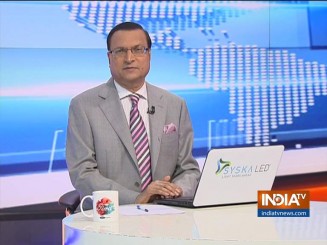 In a historic, landmark event at NRG stadium in Houston on Sunday, Prime Minister Narendra Modi and US President Donald Trump took a sort of victory lap, hand in hand, accepting accolades from the rapturous Indian-American crowd. Earlier, both the statesmen had lavished fulsome praise on each other, and Modi did some plain speaking about Pakistan’s terrorism export, with Trump sitting in the front row.
In a historic, landmark event at NRG stadium in Houston on Sunday, Prime Minister Narendra Modi and US President Donald Trump took a sort of victory lap, hand in hand, accepting accolades from the rapturous Indian-American crowd. Earlier, both the statesmen had lavished fulsome praise on each other, and Modi did some plain speaking about Pakistan’s terrorism export, with Trump sitting in the front row.
For me, this was a new history in the making which only a man like Modi could have carried through. Indians and Americans had never seen their leaders holding hands, making an entry on stage, praising each other and then doing a victory lap in front of a 50,000-strong audience.
Never before had a US president been a guest of the Indian prime minister on American soil. Never had an Indian prime minister said on American soil that he was introducing the US president to “my family”. Most of these Indian Americans are potential voters for Trump in next year’s crucial presidential elections.
For the first time, a US president, holding hands with the Indian prime minister inside a stadium, could have felt that his stature would rise and this would work to his advantage.
Till now, we, in India, had always been seeing India standing as a younger brother with the US, but Sunday night images were different. Both the statesmen stood as equal partners on stage, beaming with pride. Narendra Modi has truly raised India’s stature in the comity of nations.
The images of Houston event are endearing. Right from the grand welcome given to Modi, with spectators chanting ‘Modi, Modi’ and US Senators, House representatives, and other American leaders standing as the Indian PM took the stage till the final victory lap.
It was Modi’s idea to hold Trump’s hand and do a sort of victory lap around the stadium greeting the rapturous crowd. Clearly, Modi was the star of the show, and yet, as a graceful host, he also made Trump the star of his show – both through his speeches and action.
There was another image which was eye-catching. As Modi and Trump strode towards the stage from the ramp, with dance performers standing in a line, a nine-year-old boy from Karnataka, Satwik Hegde, who had taken part in the yoga exercise, suddenly took out his cellphone and requested the leaders for a selfie. Modi noticed the boy, and willingly posed with him and Trump for a selfie.
Atmospherics apart, Modi in his speech clearly outlined the success that his government has achieved in Swachh Bharat, Ujjwala mission providing LPG to poor families, Ayushman Bharat and several other big schemes. Modi spoke about the target of a 5-trillion-dollar economy for India, and said he was confident that the US economy would be a major part in our endeavor.
Let me delve into the past. In 1990, Narendra Modi stood as a tourist outside the White House, and 29 years later, the US president was assuring him that he was India’s closest friend in the White House.
In 2006, Geroge W. Bush was the US president and the US refused to grant a visa to Narendra Modi, but 13 years later it was Modi who is campaigning for the US president saying ‘Ab Ki Baar, Trump Sarkar’.
In 2012, 65 lawmakers from India had written a joint memorandum to the US president asking him not to grant visa to Modi, and seven years later, more than 60 US House representatives and senators stood in line to shake hands with Modi, and some of them took selfies with him.
We have had many prime ministers in the past. They used to visit the US. Several of them struck good personal rapport with past US presidents, but these were relationships in which a superpower was dealing with a developing nation. In those days, it was a big thing when the US president gave time to our prime minister in the White House.
Narendra Modi has completely upturned the entire format. He has brought the India-US relationship on an even keel. The Indian prime minister was not seen as seeking something, but was being seen as giving something to the US president.
I see this as the beginning of an equal relationship – a relationship about which India can be proud of. In the coming days and weeks, we shall be hearing more about the outcomes of this equal relationship.
Click Here to Watch Full Video | Get connected on Twitter, Instagram & Facebook
A bold and historic move by Finance Minister Sitharaman
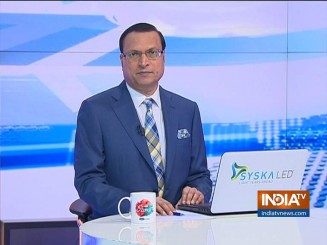 In a bold economic measure, Finance Minister Nirmala Sitharaman on Friday announced a reduction in corporate tax rate for domestic manufacturing companies from 30 per cent to 22 pc. This was aimed at giving a boost to Make In India initiatives. For new manufacturing companies, the corporate tax has been reduced from 25 per cent to 15 pc.
In a bold economic measure, Finance Minister Nirmala Sitharaman on Friday announced a reduction in corporate tax rate for domestic manufacturing companies from 30 per cent to 22 pc. This was aimed at giving a boost to Make In India initiatives. For new manufacturing companies, the corporate tax has been reduced from 25 per cent to 15 pc.
The fiscal changes will be brought through ordinance. The measure was timely because the GDP growth rate had slipped to 5 per cent this time, a six-year low.
This was the third time in last three weeks that Finance Minister Nirmala Sitharaman has made announcements to give a boost to business and economy. The announcement was in a sense historic.
The Bombay Stock Exchange sensex recorded its highest jump of nearly 2,000 points recorded in the last ten years, and India Inc leaders have welcomed the step as “a big bang reform”.
Naturally, the financial outgo for the Central exchequer would be to the tune of Rs 1.45 lakh crore as it may widen fiscal deficit, but it will definitely improve overall sentiment in business and economy. During the last several months, no fresh investments in business projects were being made and there was a steep fall in investment by foreign institutional investors. Sitharaman’s bold step will address these concerns squarely.
One more area that is left is the imposition of steep surcharge on super rich income tax payers in the last Budget. There should be a rethink about it and it should be revised.
Click Here to Watch Full Video | Get connected on Twitter, Instagram & Facebook
Why Modi spoke about Kashmir and Savarkar in his Nashik rally
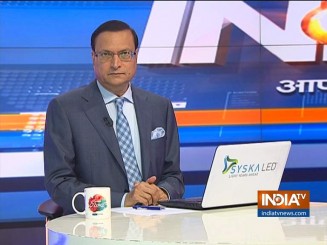 Maharashtra will have assembly polls next month, along with Haryana and Jharkhand, and all the major and regional parties are gearing up for the fight. Prime Minister Narendra Modi addressed a huge election rally in Nashik on Tuesday.
Maharashtra will have assembly polls next month, along with Haryana and Jharkhand, and all the major and regional parties are gearing up for the fight. Prime Minister Narendra Modi addressed a huge election rally in Nashik on Tuesday.
In his speech, Modi praised Chief Minister Devendra Fadnavis’ performance and sought another term for him. Apart from other issues, he focussed on Kashmir and freedom fighter Veer Savarkar.
Modi said, “Earlier we used to raise the slogan ‘Kashmir Hamara Hai (Kashmir is ours), but now our slogan should be “Kashmir ko banana hai (we must build a new Kashmir). The time has come to turn Jammu & Kashmir into a paradise. Already we have lost 42,000 people in Kashmir due to terrorism.”
The PM’s speech makes it quite clear that Kashmir will be at the top in the list of poll issues that will figure in Maharashtra, Haryana and Jharkhand, where the BJP is seeking another term. On Thursday, Modi clearly said that the decision to nullify Article 370 was taken “keeping in view the sentiments of 130 crore Indians”.
Modi said: “A lot of efforts are being made from across the border (read Pakistan) to spread unrest in the valley. The youths, mothers and sisters in Jammu and Kashmir have now made up their mind to come out of the long phase of violence. They want development and jobs.”
Modi mentioned Kashmir because Nationalist Congress Party supremo Sharad Pawar had recently criticized the house arrest of opposition leaders in the valley. Modi said: “I can understand the confusion of the Congress. But Sharad Pawar? I feel bad when an experienced leader like him makes wrong statements for votes. He said he likes the neighbouring country. It seems he finds them better than us, but the world knows where the terror factories lie.”
Modi then touched upon the issue of the great freedom fighter Veer Savarkar, a figure respected by the people of Maharashtra. The PM said: “Maharashtra has given birth to many brave sons, like freedom fighter Veer Savarkar. It was Savarkar who smiled in the face of adversity even when he was being tortured by the British during the freedom struggle. Savarkar was a leader who instilled the pride of nationalism in our youths.”
Modi raised the issue of Savarkar because the Congress party in 2016 had posted a series of tweets calling Savarkar a “traitor” and alleging that he had “begged for mercy from the British”. Savarkar’s grandson Ranjit Savarkar had filed a complaint before a Mumbai court which has now directed the police to question Rahul Gandhi in this matter. Surely, this issue will gain traction as the poll campaign rises to a feverish pitch.
Click Here to Watch Full Video | Get connected on Twitter, Instagram & Facebook
Why SC wants to deliver its Ayodhya verdict in November
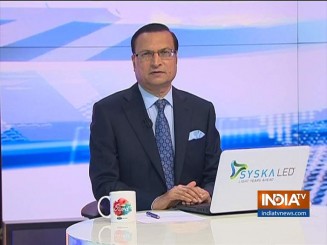 The five-judge Constitution Bench of Supreme Court, headed by Chief Justice Ranjan Gogoi, on Wednesday said that it hopes to conclude hearing in the Ayodhya case by October 18, and the bench would take four weeks to write the judgement.
The five-judge Constitution Bench of Supreme Court, headed by Chief Justice Ranjan Gogoi, on Wednesday said that it hopes to conclude hearing in the Ayodhya case by October 18, and the bench would take four weeks to write the judgement.
The verdict is going to be pronounced on or before November 17, the day Chief Justice Ranjan Gogoi retires. This litigation over the ownership of 2.77 acres of Ramjanmabhoomi-Babri Masjid land in Ayodhya is 70 years old, but the dispute over the land has been lingering on for more than 150 years, both during the British rule and in the post-Indepence period.
As many as 14 appeals were filed in the Supreme Court against the 2010 Allahabad High Court verdict, that was delivered in four civil suits. The High Court in its verdict had said that the disputed 2.77 acres of land be divided equally between three parties – Sunni Waqf Board, Nirmohi Akhara and the representatives of Ram Lalla – the child deity.
The Supreme Court verdict, if given in November, will be a landmark one, because this is one case in which several mediation efforts have failed. The Chief Justice wants to deliver the verdict before he retires, but there are also sceptics who say that fresh petitions may be filed to delay the hearing and verdict, so that the dispute may linger on.
If the apex court is unable to finish hearings by October 18, and if the judges do not get enough time to write their judgements before the retirement of the Chief Justice, then the bench will have to be reconstituted for fresh hearings. This would mean that the case would drag on.
Now that the hearings are in the final stage, the people of India want an end to this vexed dispute, once and for all. The sooner, the better.
Click Here to Watch Full Video | Get connected on Twitter, Instagram & Facebook
Why Modi is a successful Prime Minister
 In my 40 years of public life, I have seen several prime ministers from close quarters, had conversations with them and assessed their work, but I can definitely say that none had the matching vigour and courage that one notices in Narendra Modi.
In my 40 years of public life, I have seen several prime ministers from close quarters, had conversations with them and assessed their work, but I can definitely say that none had the matching vigour and courage that one notices in Narendra Modi.
I have never seen any prime minister who toiled as hard while in office as Narendra Modi. The IAF air strike on Balakot inside Pakistan and revocation of Article 370 were tough decisions that required limitless courage, and yet Modi the PM did it, without batting an eyelid.
Since the day he took over as Prime Minister in May, 2014, Narendra Modi has not taken a single day leave for rest and recreation. He is a man who does not like to waste time on evening parties and dinners. Each minute of his schedule is always linked to a work, a plan or a vision.
Many people think Narendra Modi is a hard task master and does not spare others. But I can say, Modi is a hard task master only for himself. He never compromises with his daily schedule and routine, does yoga exercises daily, his breakfast, lunch and dinner are frugal and always on time, he is very punctual and always prefers to do most of his work within specified timeline.
It is also a fact that Modi is very sensitive and emotional about others. He always stands by those he trusts, but he never tolerates lies and dishonesty. It is because of his sterling character that top industrialists and businessmen now say that there cannot be any wheeling-dealing at the top. The middlemen who used to walk the corridors of power five years ago are now unemployed, some are inside jail and some others are out on bail.
Narendra Modi has shown to the nation how a government can be run, free from corruption and how a government can strike fear in the minds of those who are dishonest and corrupt. Modi has said this clearly that such people will always have to live in fear, of the law.
In a nutshell, I can say that Modi’s critics have failed to read his mind. They cast doubts on his policies and intentions, but, as they say, there is no cure for doubt. This is the reason, why his opponents continued to lose, and Modi wins, over and over again. On behalf of India TV, I offer my best wishes to our Prime Minister on his 69th birthday.
Click Here to Watch Full Video | Get connected on Twitter, Instagram & Facebook
The significance of Trump attending Modi’s event in Houston
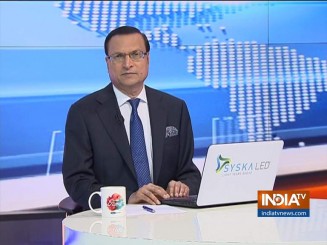 US President Donald Trump will join Prime Minister Narendra Modi at the ‘Howdy Modi!’ mega rally in Houston, Texas on September 22. Both the leaders will be addressing a record crowd of more than 50,000 Indian-Americans at the event.
US President Donald Trump will join Prime Minister Narendra Modi at the ‘Howdy Modi!’ mega rally in Houston, Texas on September 22. Both the leaders will be addressing a record crowd of more than 50,000 Indian-Americans at the event.
The ‘Howdy Modi!’ event will be the first time that a US president will be addressing a gathering of Indian-Americans at one place. On Monday, Modi tweeted: “The special gesture of President Donald Trump to join us in Houston highlights the strength of the relationship and the recognition of the contribution of the Indian community to American society and economy”.
The coming together of President Trump and Prime Minister Modi at a mega rally inside the US signifies the emergence of our PM as one of the top leaders of the world. It also denotes the tremendous amount of respect that the world powers have towards India.
Of course, there are critics in India who are trying to connect Trump joining Modi’s rally to the forthcoming US presidential elections later next year. These Modi baiters say that Trump is more interested in the votes of Indian American citizens.
I want to tell them this is not the first time that elections are being held in the US. There had been elections in the past, and the votes of Indian-Americans were counted by American leaders as vital. But never had a US president shared stage with an Indian prime minister for addressing the Indian diaspora in the US.
This development should be seen as a big achievement for our foreign policy makers. It also marks the emergence of India on the international stage as a country respected by world powers, and of course, the acceptance of Narendra Modi as a world leader respected by his contemporaries.
Click Here to Watch Full Video| Get connected on Twitter, Instagram & Facebook
Why Imran Khan sounds desperate?
 Pakistan Prime Minister Imran Khan addressed a rally in Muzaffarabad, Pak Occupied Kashmir on Friday and in a belligerent tone he asked the crowd “not to cross the Line of Control towards Kashmir valley but wait for his signal” after he completes his visit to the United Nations.
Pakistan Prime Minister Imran Khan addressed a rally in Muzaffarabad, Pak Occupied Kashmir on Friday and in a belligerent tone he asked the crowd “not to cross the Line of Control towards Kashmir valley but wait for his signal” after he completes his visit to the United Nations.
This appears to be a new form of tactic on part of the Pakistani leadership, which is desperate after failing to get support from major world powers on the Kashmir issue. That is why Pakistani leaders, both civilian and military, are talking about war, in various forms. Leading them is their Prime Minister Imran Khan, who, in order to divert attention of his people from domestic economic crisis, is egging them on to march towards Jammu & Kashmir.
Friday’s rally marked the third visit by Imran Khan to POK within a month. Accompanying him were his Home Minister, Defence Minister, Foreign Minister, Railway Minister, and other party minions. Since the crowds at his rallies are few, cricketer Shahid Afridi and Pakistani actors and singers were roped in, and the rally began with catchy film songs to attract the audience.
Imran Khan then railed against India and Prime Minister Modi, and threatened to “retaliate” (eent ka jawaab pathar) if India attacked Pakistan. The Pakistani PM also warned world powers of “grave consequences from the Islamic community” if it continued to ignore the Kashmir issue.
Imran Khan knows it well that Pakistan can never win a conventional war against India. So he changed tack and asked the Pakistani youths to be prepared “to cross the Line of Control”. A war is fought by armies and not civilians, and Imran Khan should be the best person to know this.
The UN General Assembly, an annual affair, is meeting in the last week of September and both Prime Ministers Narendra Modi and Imran Khan are due to address the august gathering. Pakistan foreign minister raised the Kashmir issue at the UN Human Rights Council meeting in Geneva this week, but none of the big world powers supported him.
Pakistan Interior Minister Aijaz Ahmed Shah remarked that the “world is no more listening to Pakistan”. That is why, Imran Khan warned western powers on Friday that they would have to face the consequences if war broke out between India and Pakistan over the Kashmir issue. It clearly reflects the desperation of a failing Pakistani leadership.
It is now amply clear to all that the revocation of Article 370 granting special status to Jammu and Kashmir is an internal matter of India, and India has the sovereign right to amend its Constitution and laws. Pakistan’s argument that it is an old dispute which requires third party mediation, falls flat on this premise.
Imran Khan is trying to divert the attention of his people from the failures of his government in tackling inflation, economic crisis and dwindling foreign reserves. His war mongering may or may not lead to war, but he must be staring at hard facts. The fact is that India has won all the four wars that it has fought with Pakistan since 1948. The sooner the Pakistani leadership realizes this, the better.
Click Here to Watch Full Video| Get connected on Twitter, Instagram & Facebook
Let us all join the noble mission to banish single-use plastics
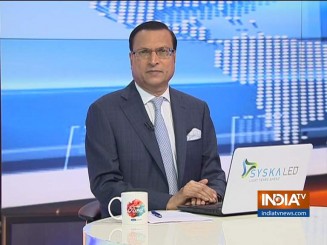 Prime Minister Narendra Modi has given a clarion call to the nation to get rid of single-use plastics by October 2, the 150th birth anniversary of Mahatma Gandhi. At a function in Mathura, Modi met a group of nine women labourers, sat with them with piles of different kinds of plastics and discussed with them how to segregate plastics from garbage.
Prime Minister Narendra Modi has given a clarion call to the nation to get rid of single-use plastics by October 2, the 150th birth anniversary of Mahatma Gandhi. At a function in Mathura, Modi met a group of nine women labourers, sat with them with piles of different kinds of plastics and discussed with them how to segregate plastics from garbage.
I fully support Prime Minister Modi’s noble mission to banish single-use plastics. All of us use plastic products in our daily life, but we never pause to think about the risks they pose to us and our environment.
Time has now come to say goodbye to use of plastics. The government may call for a ban on single-use plastics, but its successful implementation depends on our wholehearted cooperation. We must spread awareness about the risks posed by single-use plastics.
Most of us start our day by using single-use plastics. We first buy milk packed in plastic pouches, carry them in polythene bags, then buy vegetables and fruits from vendors in polythene bags, we also buy drinking water packaged in plastic bottles, purchase potato chips and other eatables packed in plastic, and in offices and homes, drink tea and coffee in plastic cups with plastic covers.
From milk to vegetables to tea and coffee, single-use plastic has become part of our daily routine. We have to get rid of them. Most of these single-use plastics end up in garbage bins and from there, they find their way to huge garbage dumps that encircle our cities. Polythene shopping bags, plastic bottles, straws, cups, plates, food wrappers, gift wraps, disposable coffee cups, plastic spoons, plastic forks, plastic containers, all of them end up in garbage dumps.
The problems arise when these are taken for recycling. Every year, we create 1.40 crore tonnes of plastic garbage, out of which people living in our 60 cities contribute the most.
These single plastics are one of the main causes behind global warming and climate change. Since most of them are non-biodegradable, they damage our soil for centuries to come.
In Delhi, we have three big garbage dump hills, one at Bhalswa Dairy, the other in Ghazipur in the east, and the third at Okhla in the south. There are big plants which treat waste material, but only one-thirteenth of single use plastics, which comes to merely 7 per cent, can be recycled. The rest of the plastics lie deeply embedded in the ground, and over the years, running water from this surface reach our rivers and seas, endangering the fate of our future generations.
You may have seen visuals of huge quantities of polythene bags being taken out from the stomachs of dead cows and other cattle. In a single case in Nagore, Rajasthan, 170 kg of polythene was extracted from the stomachs of a cow and a bullock. Nearly 80 kg polythene was extracted from the cow’s stomach and the remaining 90 kg polythene was found inside the bullock’s stomach.
Plastic waste also ends up on the floor of the seas endangering marine life. In Davao, Phillipines, nearly 40 kg plastic was found from the stomach of a dead whale. A UNESCO report says, at a least one lakh marine animals die every year due to plastic waste. Nearly 2,000 species of fish face extinction due to plastic pollution. Another scientific study says, effects of plastic pollution have been noticed in at least 90 per cent of sea birds.
If single-use plastic is burnt instead of recycling, it releases toxic gases in the air. Single-use plastic that lie on garbage dumps emit methane gas, which can cause climate change. Methane gas is 30 times more toxic than carbon dioxide. Sanitation workers die of methane gas when they enter deep septic tanks.
You may not be knowing it, but it is a fact that single-use plastics find their way to our body. On an average, 50 molecules of plastic waste reach our body through air, food and water. These can cause harmful diseases. Styrofoam is also part of the plastic family. Normally, styrofoam is used to package electronic and other products. This can harm our nervous system, lungs and reproductive organs.
In 2012, the Supreme Court had said that a huge atomic bomb is ticking in the form of plastic waste. A FICCI study says, an average Indian uses a minimum of 11 kg plastic in a year, while an American uses 110 kg a year. Throughout the world, 100 billion plastic bags are manufactured every year. We throw 35 lakh tonnes of plastic bags every year.
In India, we generate 26,000 tonnes of plastic waste daily. This adds up to 95 lakh tonnes a year. Uttar Pradesh, Gujarat, Punjab, MP and Odisha are the five states that consume plastic products heavily. Not only this, 1.5 lakh tonnes of plastic waste enter India from foreign shores every year. A 2017 report by Nature Communication says, 1.1 lakh tonnes of plastic waste is thrown into river Ganga every year.
The question now is: what is the way out? We have to banish single-use plastics from our life. Already, 13 countries including the US, New Zealand, France, Canada, Morocco, Kenya, Zimbabwe, Bangladesh and South Korea, have banned single-use plastics. India is going to impose ban on single-use plastics on October 2. In India, the government has already banned production, import, storage, transport and sale of plastics of less than 50 microns, but this order is being flouted with impunity.
After the Prime Minister’s appeal, campaign against single-use plastics has begun in several cities and states. People have started using metal and glass bottles instead of plastic. Use of plastic water bottles has been prohibited in several ministries of central government. Three students of Dr. Ambedkar Institute of Technology in Kanpur have produced eco-friendly plastic by using potato and soap.
Banishing single-use plastics is an uphill task. We consume 1.7 crore tonnes plastic products a year, out of which only 7-10 per cent are used in packaging. The problem lies in replacing plastic packaging with another viable form. The turnover of packaged water industry in India is roughly Rs 30,000 crore and this industry employs seven lakh people. We have to factor in this fact before taking a decision.
It is a hard fact that there is presently no viable substitute to single-use plastics. But the time has now come to say farewell to plastics. There may be initial hiccups, but a plastic-free India is a must for the sake of our future generation and for the sake of our beautiful earth.
Please stay away from plastics. To the maximum extent possible, kindly use cloth or jute bags to replace plastic. Avoid using non-recyclable plastic bottles and plastic straws. These are small suggestions, but if followed scrupulously, it can play a big role.
Secondly, our R&D scientists should put in their best efforts to find a viable product to replace single-use plastics. As part of India TV’s initiative towards a plastic-free India, I assure you, I will show in my ‘Aaj Ki Baat’ program, news reports about scientists who are working hard and will surely attain success. I hope, the government will encourage these scientists. Let us vow not to use plastic and let us also persuade others too. This is, after all, a noble mission.
Click Here to Watch Full Video | Get connected on Twitter, Instagram & Facebook
All of us sorely miss the absence of Arun Jaitley
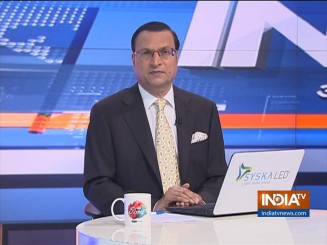 Memories refuse to fade even as 17 days have passed since the demise of former Finance Minister Arun Jaitley. His friends, acquaintances and admirers across the political spectrum remembered the departed leader at a condolence meeting in New Delhi on Tuesday.
Memories refuse to fade even as 17 days have passed since the demise of former Finance Minister Arun Jaitley. His friends, acquaintances and admirers across the political spectrum remembered the departed leader at a condolence meeting in New Delhi on Tuesday.
Prime Minister Narendra Modi, recalling Jaitley as “mera chhota dost” (my young friend) said “I miss my young friend each moment…We all have so many memories about Arunji , but think about me who had a long association with him for 30-35 years”.
In an emotional tone, the Prime Minister said, “One should never face a situation, when one has to offer condolences to a friend younger in age.” Modi is 69, and Jaitley passed away at the age of 67.
NCP President Sharad Pawar, aged 78, said: “Today I am unhappy with Arun Ji, because he had no right to go before me.”
Words are inadequate to describe Arun Jaitley’s talent and his multi-faceted personality. He was a gem of an individual – a man who never revealed to others, nor ever worried about his own difficulties. He was always ready to help out others in need. He always thought about how best to work for the society and the nation at large. He used to give sound advice to friends how to come out of tricky situations.
Arun had a huge repository of knowledge, and with his passing away, the world is the loser. The void that his passing away has created may be difficult to fill up.
Click Here to Watch Full Video | Get connected on Twitter, Instagram & Facebook
We must keep the morale of our ISRO scientists high
 The present status of Vikram Lander on the Moon’s surface is ambiguous. News agency PTI quoting an unamed ISRO official reported that the lander was intact, but was slightly tilted in one direction. In the evening, ISRO office sources said that they were not confirming this report.
The present status of Vikram Lander on the Moon’s surface is ambiguous. News agency PTI quoting an unamed ISRO official reported that the lander was intact, but was slightly tilted in one direction. In the evening, ISRO office sources said that they were not confirming this report.
Chandrayaan-2’s lander Vikram had a hard landing on September 7 and an ISRO official told PTI that the lander was “intact and not broken”. He also said that “it is in a tilted position. Though the lander hit the Moon’s surface hard while landing, it was still very close to the scheduled touchdown site as per the image sent by the orbiter’s onboard camera”.
Whatever may be the status, ISRO scientists are trying to their best to re-establish contact with Vikram lander. Science, after all, is a game of infinite probabilities. It is not necessary that every experiment or mission should succeed or come up to expectations. There is no need to abandon a dream only because of a single failure. There is always a next opportunity.
Our scientists and engineers at ISRO have done a commendable job over the years. In their first attempt (Chandrayaan-1) they sent our spaceship up to a distance of 384,440 kilometres to the Moon, and in the second attempt, the lander was in contact till 2.1 km above the Moon’s sufrace. Vikram, after all, landed on the Moon, though it cannot be called a soft landing.
It is true that we could not fulfill our aim to bring out the rover Pragyan on the lunar surface, due to this last minute glitch, but nevertheless we can say that our path is correct, our technology is reliable and we shall overcome whatever small obstacles that remain, in our next mission.
The entire nation is proud of our ISRO scientists and engineers. They truly deserve our congratulations. We must keep their morale high, and above all, we should trust their capabilities.
Click Here to Watch Full Video | Get connected on Twitter, Instagram & Facebook
India firmly stands by our ISRO scientists despite Vikram setback
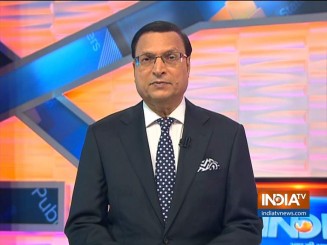 All was well and the nation was awake most of the night watching with anticipation the descent of Chandrayaan2’s lander Vikram towards the Moon. Almost every one, including Prime Minister Narendra Modi, was waiting for the good news to come.
All was well and the nation was awake most of the night watching with anticipation the descent of Chandrayaan2’s lander Vikram towards the Moon. Almost every one, including Prime Minister Narendra Modi, was waiting for the good news to come.
Vikram was descending with reduced velocity even as the brakes were being applied. When it was 2.1 km away from the Moon’s surface, it slightly veered off its trajectory and then suddenly lost contact with the Earth stations. Initially, there was suspense at the Mission Control Centre, as scientists awaited for the faintest signal from Vikram which never came. The suspense was followed by gloom, and ISRO chairman K. Sivan announced that communication with the lander has snapped, and data are being collected.
So near, yet so far. On Saturday morning, addressing the space scientists and engineers in Bengaluru, the Prime Minister unequivocally said that “our will and determination will not waver despite obstacles”.
Modi said, “Resilience and tenacity are central to Indian ethos. ..This is the reason, why despite so many obstacles, our civilization stands tall…I can proudly say that the effort was worth it and so was our journey.”
The Prime Minister pointed out that the main vehicle Chandrayaan2 was still orbiting the Moon normally and shall continue to do so. He praised ISRO scientists and engineers by saying that they have dedicated major part of their lives towards bringing glory to Mother India.
Modi said, “the obstacle came at the last step (descent of Vikram), but we will not waver from the march towards our objective….The desire to hug the Moon has increased all the more after today’s obstacle…You came as close as you could.”
Every Indian is today confident that our resilient space scientists will definitely find out ways and means to carry out another lunar mission with spectacular success. Our scientists tried to soft-land Vikram near the South Pole of the Moon, a terrain which no country has reached so far.
I am sure the “new dawn”, which the Prime Minister has spoken about, will soon come, thanks to the untiring efforts of our ISRO scientists.
How Chidambaram failed in his bid to avoid going to Tihar jail
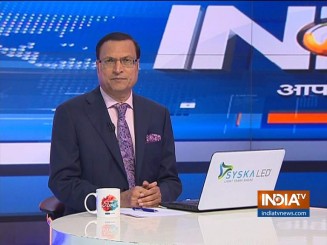 Former Finance and Home Minister, senior Congress leader and Rajya Sabha member P. Chidambaram was sent to Tihar jail on Thursday for two weeks by a Special CBI court in connection with the INX Media corruption case. He has been lodged in Jail 7, and on court’s orders, allowed to take his glasses and medicines with him.
Former Finance and Home Minister, senior Congress leader and Rajya Sabha member P. Chidambaram was sent to Tihar jail on Thursday for two weeks by a Special CBI court in connection with the INX Media corruption case. He has been lodged in Jail 7, and on court’s orders, allowed to take his glasses and medicines with him.
Chidambaram and his top lawyers made desperate attempts, both in the Supreme Court and then in the Special Court, to prevent him from being sent to prison, but the Special CBI Judge Ajay Kumar Kuhar declined to free him on bail after completion of 15 days in CBI custody.
The Special CBI judge’s order came after a Supreme Court bench comprising Justice R. Bhanumathi and Justice A. S. Bopanna denied bail to Chidambaram in the INX Media money laundering case being probed by Enforcement Directorate. The apex court said “white-collar crimes are committed with minute planning and deliberate design and in such cases, custodial interrogation is needed and granting bail to an accused before arrest can hamper the probe.”
The Supreme Court said, “Grant of anticipatory bail, particularly in economic offences would definitely hamper effective investigation. Having regard to the materials said to have been collected by ED and considering the stage of the investigation, we are of the view that it is not a fit case to grant anticipatory bail.”
Chidambaram’s lawyers tried another trick by even offering surrender before the ED so that he could at least be placed in their custody instead of being sent to jail, but the ED lawyer said they do not require his custody at this stage.
Chidambaram had been brought to the Special Court on Thursday in a CBI vehicle, and in the evening he was taken away in a jail van to Tihar prison. Pictures of a former Finance and Home Minister sitting alone inside a jail van shall always remain etched in memory.
There was a time when big political leaders, despite facing serious cases, managed to avoid going to prison through legal subterfuge, but the government led by Prime Minister Narendra Modi has changed the very definition of custody.
Chidambaram fielded the country’s top legal eagles like Kapil Sibal, Abhishek Manu Singhvi and Salman Khurshid, but failed in his bid to avoid going to prison.
The charges levelled against the former Union Minister are serious, and the ED is waiting soon after the CBI is over with its probe. If Chidambaram manages to get bail, after going to prison, the ED is surely going to take him into custody. The coming months are surely going to cause more headache to the Congress leader.
It is an irony of fate that Chidambaram was the Home Minister, when BJP leader Amit Shah was sent to jail. At that time, Chidambaram had remarked that the agencies were working independently, the judicial custody was because of a court order and the government had no role in it.
Now that the roles have been reversed, Chidambaram and his friends are crying political vendetta, though the fact remains that he has been sent to jail on court orders and the same agencies are working independently.
Click Here to Watch Full Video | Get connected on Twitter, Instagram & Facebook